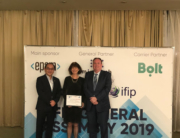 PRO-VE 2022 – the 23rd IFIP/SOCOLNET Working Conference on Virtual Enterprises – was held from 19-21 September in Lisbon, Portugal and sponsored by IFIP Working Group 5.5.
PRO-VE 2022 – the 23rd IFIP/SOCOLNET Working Conference on Virtual Enterprises – was held from 19-21 September in Lisbon, Portugal and sponsored by IFIP Working Group 5.5.
Although initially planned as a hybrid event due to COVID uncertainties, PRO-VE 2022 ended up being run primarily as a physical event, attracting almost 90 participants. This provided great opportunities for face-to-face interactions, discussions, and exchange of experiences.
Three excellent keynotes enriched the program:
- Cognitive Digital Twins: connecting the dots of Closed-Loop Lifecycle Management, by Dimitris Kyritsis, EPFL, Switzerland
- Collaborative Potential of AI and Human Ingenuity in Co-creating Value in Society 5.0, by Massimiliano Luca Dragoni, European Commission
- Is resilience enough? Collaborative Networks towards antifragility, by Salvatore Ammirato, University of Calabria, Italy
The event also included 55 technical papers, three panels and one hands-on tutorial.

The main theme of the conference was Collaborative Networks in Digitalization and Society 5.0. “Digitalization” represents a major ongoing transformation in industry and services where the adoption and integration of a large variety of novel information and communication technologies leads to more efficient, flexible, agile, and sustainable systems. Digitalization became one of the key aspects of Industry 4.0. Current trends towards Industry 5.0 introduce a complementary view, targeting a sustainable, human-centric, and resilient industry. The notion of Society 5.0 represents an even more comprehensive strategy on science, technology and innovation aiming a people-centric super-smart society.

As demonstrated in recent editions of PRO-VE, collaborative networks play a central role in these transformative processes. In fact, such ambitious goals can only be achieved through collaboration among multiple stakeholders, collaboration among intelligent / autonomous systems, and collaboration among human and systems.
PRO-VE 2022 was an active forum for sharing and discussing current developments and experiences regarding the role of collaborative networks in digitalization as well as identifying and discussing challenges ahead towards a collaborative Society 5.0.
The conference explored a wide array of topics, clustered along the following themes:
- Digitalization in Collaborative Networks
- Digital Twins in Industry
- Digital Transformation Through the Lens of Sociotechnical Systems
- Collaborative Business Models and Digitalization
- Service Design for Society 5.0 and Industry 5.0
- Architectures for Collaborative Enterprise Integration
- AI Application in Collaborative Networks
- Dynamic Interplay of Humans and AI in Collaborative Networks
- AI and Digital Tools for Collaborative Healthcare Networks 5.0
- Contribution of Digital Transformation to Sustainable Supply Chains
- Agile and Responsive Supply Chains
- Risk and Resilience in Collaborative Networks
- A Path Forward Towards the Green D
- Shaping Values Through Collaborative Work
- Value Co-Creation in Ecosystems
- Sociotechnical Strategies in Collaborative Systems
Proceedings were published by Springer, under the IFIP AICT series.





